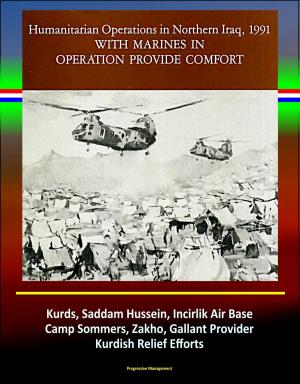Never Let the Opportunity to Prepare for a Crisis Go to Waste: The Need for Proactive Measures in the Asia-Pacific Region and Pacific Command (PACOM) to Mitigate the Impacts of Climate Change
Nonfiction, History, Asian, China, Military, United States| Author: | Progressive Management | ISBN: | 9781370042890 |
| Publisher: | Progressive Management | Publication: | March 12, 2017 |
| Imprint: | Smashwords Edition | Language: | English |
| Author: | Progressive Management |
| ISBN: | 9781370042890 |
| Publisher: | Progressive Management |
| Publication: | March 12, 2017 |
| Imprint: | Smashwords Edition |
| Language: | English |
This excellent report has been professionally converted for accurate flowing-text e-book format reproduction. The United States Pacific Command (USPACOM) is the largest combatant command, both geographically and in population. It is a volatile region, subject to destabilization by regional conflicts fueled by historical animosity and anticipated future natural resource scarcity. USPACOM is also the region most likely to be effected by natural disasters, as it has absorbed 80 percent of the world's natural disasters in the past decade. The United States will be a stakeholder in resolving the natural disasters in USPACOM. To posture the US Military resources effectively during Phase 0, the pre-crisis phase, the United States should nurture its relationship with the Philippines in terms of disaster preparation. In doing so, the United States military will posture itself in an advantageous position relative to emerging threats in the USPACOM area of responsibility. The operational reach provided by basing in the Philippines, as well as the valuable sea lines of communication, will allow the United States to maintain a tempo appropriate to address emerging threats. Additionally, pre-crisis preparedness exercises will serve as pre-combat rehearsals for the military to become familiar with the terrain and hydrography of Southeast Asia. Finally, the working relationships the military will develop while perform pre-crisis preparation, or when responding to an actual disaster, will be a combat multiplier when the military is called upon to respond to a threat.
While responding to Cyclone Nargis in Burma in 2008, the USG and DoD captured several best practices and identified areas of weakness. The Government Accountability Office (GAO) underscored the relief efforts in Burma as "less than optimal interagency coordination." A critical misstep early in the Cyclone Nargis relief efforts resulted from the perceived condemnation from then-First Lady Laura Bush of the Burmese government's failure to warn the population in time. This strategic communications effort ran counter to the narrative that the Joint Task Force (JTF) Caring Response tried to weave, which was that the United States was a trusted partner during the relief operations. Friction between the DoD and USAID resulted from divergent priorities and incongruent mission understandings. Specifically, the DoD viewed gaining access to the reclusive country as a strategic success and identified the number of C-130 relief flights allowed into the country as a metric of success. In contrast, USAID preferred to measure success in terms of what supplies were delivered. With preferences again diverging, the military opted to deliver supplies such as five gallon cans of water, maximizing the cargo capacity of the aircraft. USAID had argued that mosquito nets would be much more valuable, but the DoD disapproved because the nets were not dense enough to maximize lift capacity. On a more positive note, the GAO identified as a best practice the DoD maintaining all communications on the unclassified level, fostering effective interagency communication.
This excellent report has been professionally converted for accurate flowing-text e-book format reproduction. The United States Pacific Command (USPACOM) is the largest combatant command, both geographically and in population. It is a volatile region, subject to destabilization by regional conflicts fueled by historical animosity and anticipated future natural resource scarcity. USPACOM is also the region most likely to be effected by natural disasters, as it has absorbed 80 percent of the world's natural disasters in the past decade. The United States will be a stakeholder in resolving the natural disasters in USPACOM. To posture the US Military resources effectively during Phase 0, the pre-crisis phase, the United States should nurture its relationship with the Philippines in terms of disaster preparation. In doing so, the United States military will posture itself in an advantageous position relative to emerging threats in the USPACOM area of responsibility. The operational reach provided by basing in the Philippines, as well as the valuable sea lines of communication, will allow the United States to maintain a tempo appropriate to address emerging threats. Additionally, pre-crisis preparedness exercises will serve as pre-combat rehearsals for the military to become familiar with the terrain and hydrography of Southeast Asia. Finally, the working relationships the military will develop while perform pre-crisis preparation, or when responding to an actual disaster, will be a combat multiplier when the military is called upon to respond to a threat.
While responding to Cyclone Nargis in Burma in 2008, the USG and DoD captured several best practices and identified areas of weakness. The Government Accountability Office (GAO) underscored the relief efforts in Burma as "less than optimal interagency coordination." A critical misstep early in the Cyclone Nargis relief efforts resulted from the perceived condemnation from then-First Lady Laura Bush of the Burmese government's failure to warn the population in time. This strategic communications effort ran counter to the narrative that the Joint Task Force (JTF) Caring Response tried to weave, which was that the United States was a trusted partner during the relief operations. Friction between the DoD and USAID resulted from divergent priorities and incongruent mission understandings. Specifically, the DoD viewed gaining access to the reclusive country as a strategic success and identified the number of C-130 relief flights allowed into the country as a metric of success. In contrast, USAID preferred to measure success in terms of what supplies were delivered. With preferences again diverging, the military opted to deliver supplies such as five gallon cans of water, maximizing the cargo capacity of the aircraft. USAID had argued that mosquito nets would be much more valuable, but the DoD disapproved because the nets were not dense enough to maximize lift capacity. On a more positive note, the GAO identified as a best practice the DoD maintaining all communications on the unclassified level, fostering effective interagency communication.















